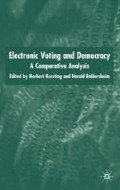Abstract
The Internet has recently become an important part of the democratic process (Wilhelm 2000; Kamarck and Nye 1999; Rash 1997; Firestone and Corrado 1996). It was only a matter of time until democracy and politics entered the digital world, and now we are moving towards holding elections over the Internet. A major step in this direction took place early in the 2000 presidential election when the Arizona Democratic primary featured the first binding Internet election for public office (Solop 2000; Alvarez and Nagler 2000).
This research was supported by the National Science Foundation (NSF 0001401).
Access this chapter
Tax calculation will be finalised at checkout
Purchases are for personal use only
Preview
Unable to display preview. Download preview PDF.
References
Alvarez, M. R. and Nagler, J. (2000) ‘The Likely Consequences of Internet Voting for Political Representation’, Paper presented at the Internet Voting and Democracy Symposium, 1 November, Loyola Law School.
Firestone, C. M. and Corrado, A. (1996) Elections in Cyberspace: Toward a New Era in American Politics. Aspen Institute Programme on Communications and Society. American Bar Association, Standing Committee on Election Law. Washington, DC: Aspen Institute.
Hoffmann, D. L., Novak, T. P. and Schlosser, A. E. (2000) The Evolution of the Digital Divide: How Gaps in Internet Access May Impact Electronic Commerce’, Journal of Computer-Mediated Communication, 5(3).
Hoffmann, D. L., Novak, T. P. and Venkatesh, A. (1998) ‘Diversity on the Internet: The Relationship of Race to Access and Usage’, in A. Gramer (ed.), Investing in Diversity: Advancing Opportunities for Minorities and the Media. Washington, DC. The Aspen Institute.
Jones, B. (2000) ‘A Report on the Feasibility of Internet Voting’, California Internet Voting Task Force, <http://www.ss.ca.gov/executive/ivote/>
Kamarck, E. C. and Nye, J. S. (1999) Democracy.com? Governance in a Networked World. Hollis, NH: Hollis Publishing.
Meeks, B. N. (2000) ‘Message From the People: Get Online!’ MSNBC website, <http://www.msnbc.com>
Medill News Service (2001) ‘Survey: Nonvoters Not a Lost Cause’, in Inside Mediall News, <http://www.mediall.nwu.edu/inside/2001/nonvoters.html>
Nathan, S. (2000) ‘More Investors Click to Cast Proxy Votes’, USA Today (27 March): 13B.
Raney, R. F. (2000) ‘After Arizona Vote, Online Elections Still Face Obstacles’, in The New York Times On-line, <http://www.nytimes.com/library/tech/00/03/cyber/articles/21vote. html>
Rash, W. Jr. (1997) Politics on the Net: Wiring the Political Process. New York: W. H. Freeman.
Rohde, L. (2000) ‘Net Voting Resolves Boeing Labor Dispute’, The Standard, <http://www.thestandard.com/article/display/0,1151,13112,00.html>
Rubin, A. (2000) Security Considerations for Remote Electronic Voting Over the Internet, <http://avirubin.com/e-voting.security.html>
Solop, F. I. (1999) ‘Arizona Embraces Internet Voting’, in Social Research Laboratory, <http://www.nau.edu/~srl/releases/rel15oct99.htm>
Solop, F. I. (2000) ‘Public Support for Internet Voting: Are we falling into a “Racial Ravine”’, Paper presented at The American Association of Public Opinion Research, 18–21 May, Portland, Oregon.
United States, National Telecommunications and Information Administration (1999) Falling Through the Net: Defining the Digital Divide: A Report on the Telecommunications and Information Technology Gap in America. Washington, DC: National Telecommunications and Information Administration US Department of Commerce.
United States, National Telecommunications and Information Administration (2000) Falling Through the Net: Toward Digital Inclusion: A Report on Americans’ Access to Technology Tools. Washington, DC: National Telecommunications and Information Administration, US Department of Commerce.
Wilhelm, A. G. (2000) Democracy in the Digital Age. New York: Routledge.
Editor information
Editors and Affiliations
Copyright information
© 2004 Palgrave Macmillan, a division of Macmillan Publishers Limited
About this chapter
Cite this chapter
Solop, F.I. (2004). Digital Democracy Comes of Age: Internet Voting and the 2000 Arizona Democratic Primary Election. In: Kersting, N., Baldersheim, H. (eds) Electronic Voting and Democracy. Palgrave Macmillan, London. https://doi.org/10.1057/9780230523531_14
Download citation
DOI: https://doi.org/10.1057/9780230523531_14
Publisher Name: Palgrave Macmillan, London
Print ISBN: 978-1-349-51891-3
Online ISBN: 978-0-230-52353-1
eBook Packages: Palgrave Political & Intern. Studies CollectionPolitical Science and International Studies (R0)

